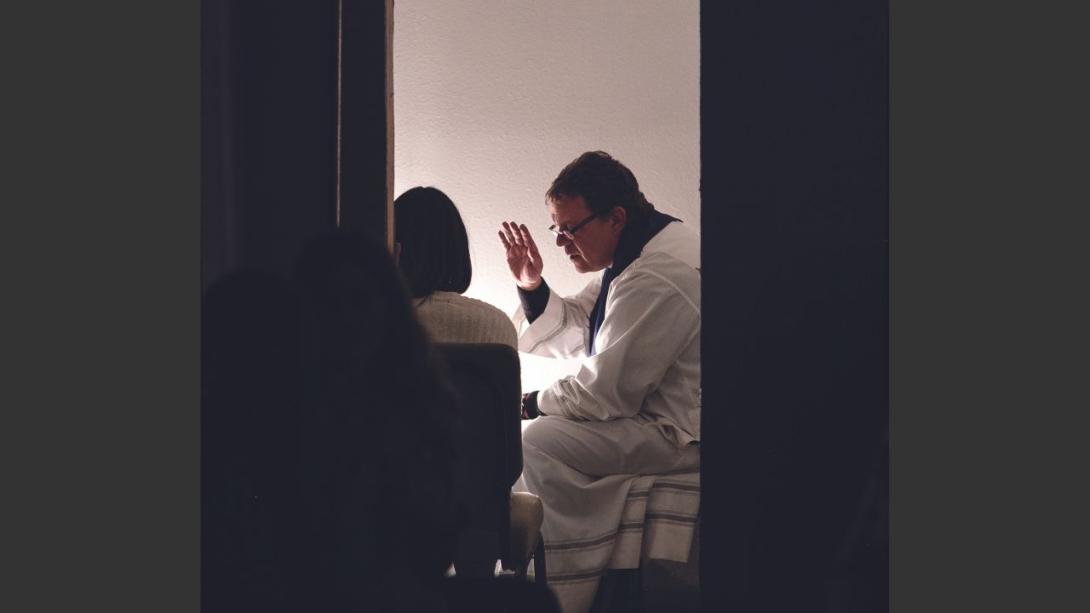“Going to confession seems almost not necessary to me... isn’t it more important to try to remedy the wrong that I have done to my neighbor?”

Photo by Josh Applegate on Unsplash
“Going to confession,” is one way to describe the sacrament of Reconciliation, but it focuses on only one part of the process of the celebration: naming our sins to the priest. Rather, the sacraments through which we express our faith are part of a living relationship.
Reconciliation calls for several steps. There must be recognition of a fault and how we have harmed our relationship with God or with others. There also needs to be a change in our way of thinking. We must make a resolution to work on our ways of acting so that we become different. And, yes, if there has been some harm to our neighbor, we need to work on repairing and renewing that relationship.
We need God’s help to bring about a change of mind and heart and to create a new way of behaving toward the other. The sacrament provides a means for receiving the grace to change and to grow.
We know that Jesus felt that forgiveness of sins was central to his mission. Sometimes, during his earthly ministry, he provoked religious authorities by introducing the action of forgiving sins into a moment of physical healing, a miracle that he was performing to reveal the presence of the kingdom of God (Mt 9:2–6).
On the very day of the Resurrection, we are told, the risen Lord shared with his Apostles the Holy Spirit and his power to forgive sins (Jn 20:22–23).
It is clear that Jesus, both before and after the Resurrection, felt that it was important to experience this. Jesus wants us to “go to confession” and to remedy the wrong we have done to our neighbor, with the help of his grace.
There is another way of seeing the sacrament of Reconciliation that may help us to approach it with a sense of its power in our lives. From the human perspective, we can acknowledge that very often we just have to tell someone whatever we are going through. In times of difficulty, whether caused by the circumstances of our lives or by our own failings and choices, we want to talk to a friend about them. Sin is certainly something that weighs heavily on us.
Many who are not Catholic (and thus do not have the sacrament of Reconciliation readily available) and, indeed, many who are Catholic (but who have not approached the sacrament very recently) find that they reach out intentionally to someone else to tell their story. It may be a good friend. It may be a hairdresser or a bartender. In current culture, it may be a talk show with a dynamic host that highlights unusual scandals or even a blog or social media.
In this case, it seems that “going to confession” to a priest is safer and more consoling. The priest and God are the only ones, besides the penitent, who are part of it, and they will not be sharing it with anyone else. The confessor may even have some good advice concerning how to repair the broken relationship and how to witness to the power of divine mercy.
Ritualizing something is helpful to us. It is one thing to feel love and affection towards someone. It is another thing to actually go to that person and tell them so. With reconciliation it is the same. By going to confession, the experience of repentance and reconciliation is deepened and more powerful.
What a gift it is to hear the priest say these words in the name of Christ and his Church:
“God, the Father of Mercies, through the death and Resurrection of his Son, has reconciled the world to himself and sent the Holy Spirit among us for the forgiveness of sins. Through the ministry of the Church, may God give you pardon and peace, and I absolve you from your sins, in the name of the Father and of the Son and of the Holy Spirit. Amen.”
“Going to confession” can provide the honesty, grace and willingness to begin again to remedy a wrong that has been done. It will also offer healing and peace of mind and heart.
If you want to hear those words addressed personally to you, go to confession! It will take a load off your heart, and you will be able to take a step closer to the neighbor you have wronged.












